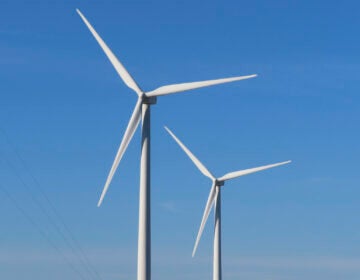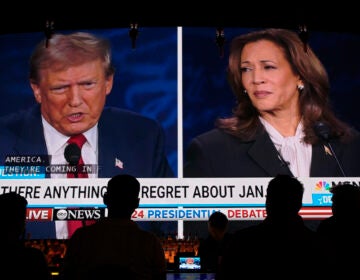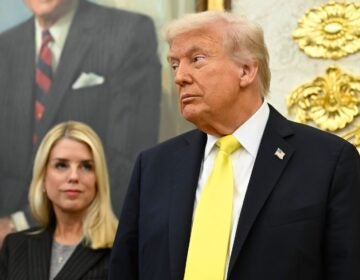No ‘seat at the table’: Why Philly-area environmental justice activists fear a Trump win
“With a Harris-Walz administration, we will at least have a seat at the table,” one activist said. “With a Trump administration, there won't be a table.”
Listen 1:04
FILE - In this Jan. 9, 2020 file photo, President Donald Trump listens as Secretary of the Interior David Bernhardt delivers remarks on proposed changes to the National Environmental Policy Act, at the White House in Washington. (AP Photo/ Evan Vucci, File)
The energy was high in the crowded event space at the Harrah’s casino in Chester by the time Zulene Mayfield took the stage.
Music blasted from the speakers. Attendees held signs reading “Pennsylvania for Harris” and chanted, “I’m with her.”
Mayfield, an activist renowned for her work fighting polluting industry in the majority Black, working-class city, where the adult asthma rate is higher than the nation’s average, struck a serious tone at the Harris rally in August.
“If you want clean air, you’d better vote,” she said. “Because if you don’t think that this thing can get worse, it will.”
Residents like Mayfield who advocate for clean air, clean water and relief from the impacts of climate change in their communities see high stakes in this fall’s presidential election.
Democratic candidate Kamala Harris has released few details about her environmental plans, but vowed to “tackle the climate crisis,” advance environmental justice, lower household energy costs and “hold polluters accountable” in her online campaign platform. Former president and Republican candidate Donald Trump’s platform includes making the U.S. “the dominant energy producer in the world,” canceling the “electric vehicle mandate,” ending “market-distorting restrictions on oil, natural gas, and coal,” and promising to end offshore wind development “on day one.”
The two have vastly different records on the environment. Harris signaled support for an investigation into whether fossil fuel companies misled the public about the dangers of climate change as California’s attorney general, and as a senator, sponsored environmental justice-focused legislation. As president, Trump rolled back over 100 environmental rules, including several related to unhealthy air pollution.
Advocates in the Philadelphia region hope Harris would build upon the Biden administration’s unprecedented focus on environmental justice and funding for efforts to curb climate change. They fear Trump would pursue deregulation that could leave overburdened communities with even fewer protections.
“With a Harris-Walz administration, we will at least have a seat at the table,” Mayfield said. “With a Trump administration, there won’t be a table.”
Penny Dryden, an environmental justice advocate in Bear, Delaware, agrees.
“It’s really a lot at stake for us,” she said.
Concerns about the strength of environmental rules
Enforcement of environmental rules would likely drop under a second Trump administration, said Cary Coglianese, a professor of law and political science at the University of Pennsylvania. Coglianese also expects a second Trump Environmental Protection Agency would put less priority on targeting enforcement in marginalized communities. Project 2025, the plan for the next conservative president from which Trump has tried to distance himself, recommends cutting staff and entire departments from the EPA.
“You can have all the rules on the books you want to seemingly protect the public from polluting businesses, but if no one’s around really to enforce them, that leaves these communities vulnerable,” Coglianese said.
When president, Trump tapped a former coal lobbyist, Andrew Wheeler, to lead the agency. During his administration hundreds of career employees and specialists left the EPA.
While Trump’s attempts to roll back environmental regulations were sometimes frustrated during his first term, it’s expected he would have an easier time during a second term.
The Biden administration finalized several environmental rules that could benefit the health of communities in the Philadelphia region. A stricter standard for soot — or unhealthy particulate pollution — in the ambient air could force Pennsylvania and New Jersey to take action to lower pollution in a handful of counties. A petroleum refinery and two chemical plants in the Philadelphia region would be subject to tighter Biden administration rules around hazardous air pollutants meant to cut cancer risk.
But both the new soot standard and parts of the hazardous air pollution rules are being challenged in court.
“You might find that a Trump Justice Department goes into federal court on these challenges and says we’re no longer prepared to defend these rules,” he said. “They’re effectively goners.”
The future of civil rights investigations by the EPA
Under federal law, the EPA must ensure recipients of federal money, such as states, cities and grantees, do not discriminate on the basis of race, color or national origin. The agency can investigate complaints of such discrimination and negotiate agreements to resolve the issue.
In the Philadelphia region, the EPA took up two of these investigations under President Biden — one in Philadelphia over the city’s permitting of a SEPTA natural gas power plant in a majority-Black neighborhood and another in Sussex County, Delaware, over allegations that state environmental regulators there failed to adequately engage Spanish and Haitian Creole-speaking residents about the expansion of a plant that uses poultry waste to produce natural gas. Neither investigation has yet been resolved.
Project 2025 recommends disbanding the stand-alone office that currently pursues these investigations and moving its legal staff back into the EPA’s Office of General Counsel.
This spring, 23 Republican attorneys general asked the EPA to drop rules that allow the agency to investigate not only cases of intentional discrimination by recipients of its federal funds, but also actions that result in disparate impacts to different groups.
A Trump EPA would be more likely than a Harris EPA to drop these disparate impact regulations, said Amy Laura Cahn, a lawyer who signed a letter urging the Biden administration to reject the AGs’ petition. Trump’s Justice Department attempted to make a similar change to its civil rights regulations in its final days.
“The barriers to redress for environmental justice communities seeking their civil rights have been, for decades, often insurmountable,” Cahn said. Doing away with the EPA’s disparate impact regulations would “create a whole ‘nother set of barriers, because it is just straight-up hard to prove intentional discrimination.”
Regardless of who wins the election, the EPA should maintain all of its tools to fight discrimination, said Chandra Taylor-Sawyer, senior attorney and environmental justice initiative leader at the Southern Environmental Law Center.
“Communities who are continuing to bear the disproportionate burden of environmental harm need enforcement now,” she said.
Federal money for projects in environmental justice communities
Environmental justice advocates in the Philadelphia region say the Biden administration brought greater access to federal grant funding than previous administrations. The Inflation Reduction Act, signed by Biden in 2022, created several grant and technical assistance programs to advance environmental justice activities in overburdened communities.
“They’re putting out so much in these last couple of years, we can’t even keep up with it,” said Maurice Sampson, eastern Pennsylvania director at the nonprofit Clean Water Action.
It’s not just the volume of federal funding, but who it’s going to. EPA grants have been more available to small, community-based organizations under Biden than previous administrations, advocates say.
“It’s a more community-driven approach,” said Jerome Shabazz, director of the Overbrook Environmental Education Center in West Philadelphia, which is part of a group of organizations that received federal money last year to act as a technical assistance hub for smaller organizations in the region. “I’ve never seen this before.”
Community Housing & Empowerment Connection Inc., the small nonprofit Dryden runs several miles from the Delaware City Refinery, received its first EPA grant under the Inflation Reduction Act to run a community-based air monitoring network, which will place monitors at dozens of homes near pollution sources. The residents will own the data and be trained to become a new crop of environmental justice advocates and leaders, Dryden said.
“[The federal government] gets it that … our communities have knowledge,” she said. “They have put their money where their mouth is.”
Harris cast the tie-breaking vote to pass the Inflation Reduction Act, while Trump has said he’d rescind any unspent money from the law (changing or repealing the law would take action from Congress).
“If [grant money] has already been given out and spent, I don’t think anybody has to worry about declaring bankruptcy and paying a bill back to the federal government for it,” Coglianese said. “But don’t count on getting any more of it.”
The Biden administration also set a goal to ensure 40% of the benefits of certain federal climate, environment, energy, transit and housing investments flow to communities that are “disadvantaged,” or underinvested in and overburdened by pollution. Notably, the administration’s definition of “disadvantaged” does not include race — despite evidence that people of color are exposed to more air pollution than white people, regardless of income.
Most parts of the cities of Philadelphia, Chester and Wilmington qualify as “disadvantaged,” as do more suburban and rural parts of Pennsylvania, Delaware and New Jersey. The Biden administration’s “Justice40 Initiative” could be reversed by future administrations, since it was established by executive order.
‘Hold her feet to the fire’
While the Biden-Harris administration has explicitly prioritized environmental justice, it has also faced criticism over granting more permits for oil drilling on federal lands than the Trump administration and green-lighting the massive Willow oil drilling project in Alaska. Environmental groups have sued the Biden administration over its toxic air pollution and coke oven battery rules, arguing they don’t go far enough to protect communities.
Mayfield, the activist in Chester, said the rollout of Biden’s Inflation Reduction Act has been too slow, with too little communication to communities. As of September, the administration had only awarded around 12% of a $3 billion pot of environmental justice grant money directly to community-based nonprofits.
While she prefers Harris to Trump, Mayfield said a Harris win would not solve all the problems facing overburdened communities.
“The biggest problem is we put all of our hope in one person. We put all of our hope in the president,” she said, “when we are the masters of our fate.”
Sampson agrees the struggle for environmental justice would continue under a Harris administration. But he also sees a clear choice between the two candidates.
“We elect [Harris] and then we go on with business as usual, with making sure we hold her feet to the fire,” he said. “But a candidate that tells us that he’s going to become a dictator from the first day is telling us that we’re not going to have those options.”

Subscribe to PlanPhilly
WHYY is your source for fact-based, in-depth journalism and information. As a nonprofit organization, we rely on financial support from readers like you. Please give today.











